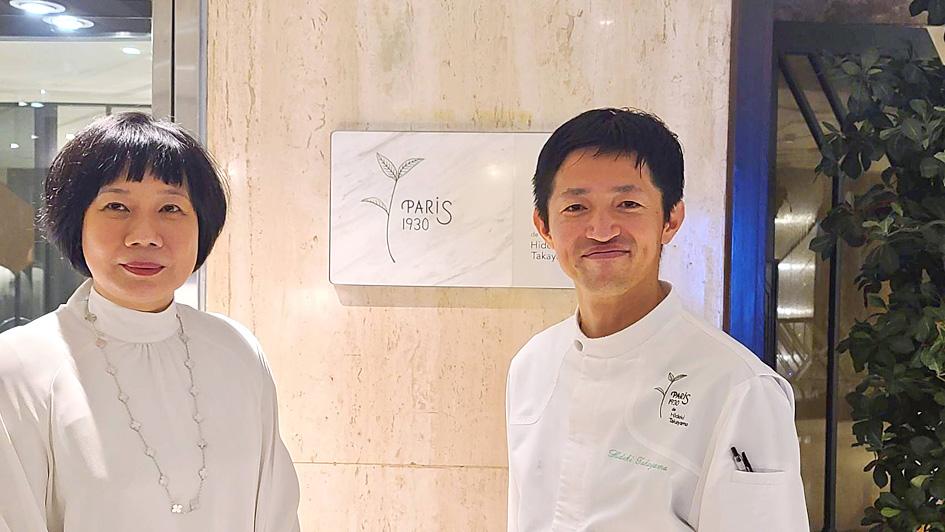Landis Taipei Hotel, the flagship property of Landis Hospitality Group (麗緻餐旅集團), is seeking to boost its food and beverage sales this year, in the hope that international travel restrictions might be lifted in the second half of the year, the company said yesterday.
“Our food and beverage business has proven to be resilient and recovered quickly from a COVID-19 slump last year, thanks to a strong, loyal clientele and fast adjustments in our operations,” Landis Group business development division assistant general manager Gary Lo (羅明威) said.
Last year’s food and beverage revenue remained at 2019 level, and might grow this year, as Taiwanese travel regularly and travel restrictions might be lifted in the fall, Lo said.

Photo: Wang Yi-hung, Taipei Times
The Michelin-starred Tien Hsiang Lo Restaurant in the five-star hotel is fully booked for Lunar New Year’s Eve on Feb. 11, despite cluster infection at a Taoyuan hospital, Lo said.
December to February is peak season for local restaurants and banquet facilities, which cater to corporate feasts and family reunions, he said.
While many companies and organizations have not held large event to reduce COVID-19 infection risks, the large number of smaller events helped business at the hotel’s restaurants, he added.
Business at the hotel’s Paris 1930 de Hideki Takayama restaurant picked up 30 percent last year from a year earlier thanks to its blend of creative French cuisine and Japanese elements, Lo said.
The hotel forecasts a 30 percent increase in packaged food sales this year, after a 50 percent rise last year, helped by the low-contact economy, he said.
However, hotel occupancy might remain low this year due to the Landis Taipei’s heavy dependence on foreign tourists, said Newman Yen (顏鎮國), general manager of the group’s hotel operations.
International travel might rebound in the second half, after a widespread rollout of COVID-19 vaccinations, he said.

South Korea’s equity benchmark yesterday crossed a new milestone just a month after surpassing the once-unthinkable 5,000 mark as surging global memory demand powers the country’s biggest chipmakers. The KOSPI advanced as much as 2.6 percent to a record 6,123, with Samsung Electronics Co and SK Hynix Inc each gaining more than 2 percent. With the benchmark now up 45 percent this year, South Korea’s stock market capitalization has also moved past France’s, following last month’s overtaking of Germany’s. Long overlooked by foreign funds, despite being undervalued, South Korean stocks have now emerged as clear winners in the global market. The so-called “artificial intelligence

NEW IDENTITY: Known for its software, India has expanded into hardware, with its semiconductor industry growing from US$38bn in 2023 to US$45bn to US$50bn India on Saturday inaugurated its first semiconductor assembly and test facility, a milestone in the government’s push to reduce dependence on foreign chipmakers and stake a claim in a sector dominated by China. Indian Prime Minister Narendra Modi opened US firm Micron Technology Inc’s semiconductor assembly, test and packaging unit in his home state of Gujarat, hailing the “dawn of a new era” for India’s technology ambitions. “When young Indians look back in the future, they will see this decade as the turning point in our tech future,” Modi told the event, which was broadcast on his YouTube channel. The plant would convert

‘SEISMIC SHIFT’: The researcher forecast there would be about 1.1 billion mobile shipments this year, down from 1.26 billion the prior year and erasing years of gains The global smartphone market is expected to contract 12.9 percent this year due to the unprecedented memorychip shortage, marking “a crisis like no other,” researcher International Data Corp (IDC) said. The new forecast, a dramatic revision down from earlier estimates, gives the latest accounting of the ongoing memory crunch that is affecting every corner of the electronics industry. The demand for advanced memory to power artificial intelligence (AI) tasks has drained global supply until well into next year and jeopardizes the business model of many smartphone makers. IDC forecast about 1.1 billion mobile shipments this year, down from 1.26 billion the prior

People stand in a Pokemon store in Tokyo on Thursday. One of the world highest-grossing franchises is celebrated its 30th anniversary yesterday.